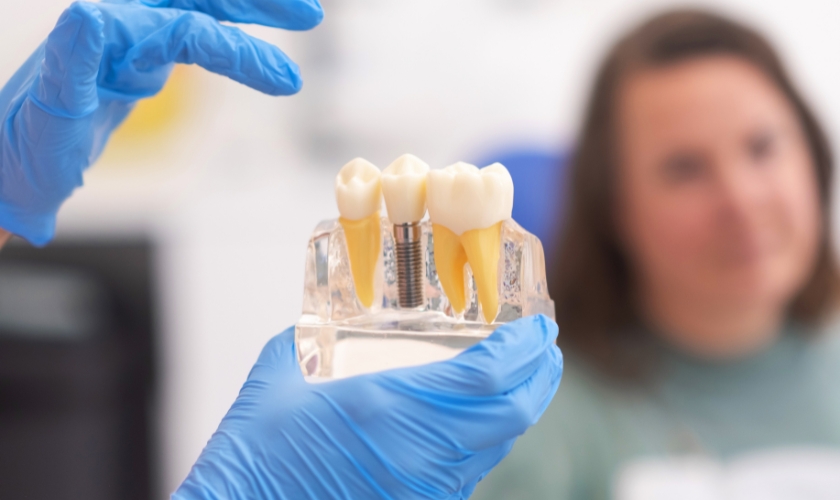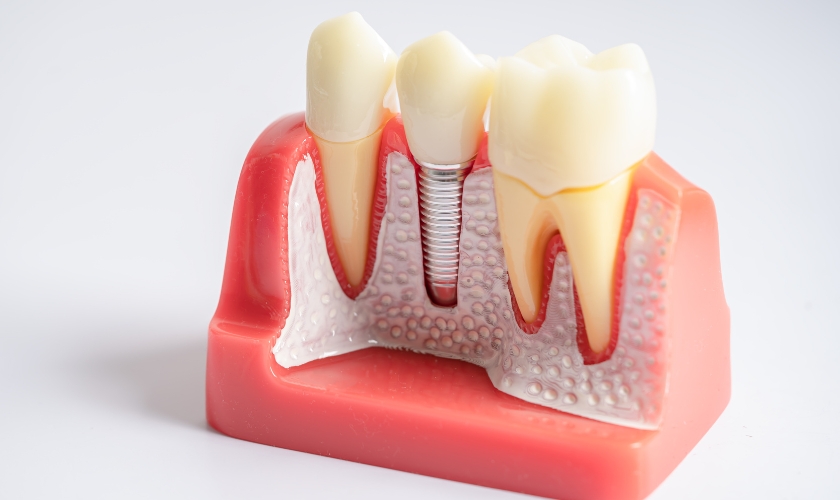
By West Albany Dental
Dental implants offer a durable and effective solution for replacing missing teeth. They help restore the appearance of your smile and your ability to chew and speak comfortably. Moreover, implants prevent bone loss in the jaw, enhancing facial structure and overall oral health.
Assessing candidacy for implants is crucial. Not everyone is suitable for this procedure. Various factors can influence the success of implants, including oral health and medical conditions. Understanding these factors can help you determine if implants are right for you.
This blog will explore what implants are, who qualifies for them, and the key factors to consider. It aims to empower you with information, guiding you to make informed decisions about your dental health.
What Are Dental Implants?
Dental implants are artificial tooth roots made from titanium. They are surgically placed into the jawbone to provide a sturdy foundation for replacement teeth. The implant has three main components: the titanium post, an abutment, and a crown. The titanium post serves as the root, while the abutment connects the post to the crown, which is the tooth’s visible part.
The dental implant process typically involves several steps. First, a dentist evaluates your oral health and jawbone condition. Next, they surgically place the titanium post into the jawbone.
Over time, the bone heals around the implant in a process called osseointegration, which secures it in place. After healing, the dentist attaches the abutment and custom crown. This multi-step process often takes several months but results in a strong and natural-looking replacement tooth.
Who Is a Candidate for Dental Implants?
Several factors determine if you are a candidate for implants. Age plays a significant role. Most candidates are at least 18 years old, ensuring complete jawbone growth. Your overall health also matters. Those with chronic conditions such as heart disease or diabetes may face complications. Therefore, consulting with a healthcare professional is vital.
Oral health is another critical criterion. Healthy gums and sufficient bone density are essential for supporting dental implants. If you have gum disease or significant bone loss, you may need treatment before considering implants.
Certain habits can impact your candidacy. Smoking, for instance, can hinder healing and increase the risk of complications. Similarly, uncontrolled diabetes can impair healing. It is crucial to discuss any existing conditions or habits with your dentist, as they can provide tailored advice based on your situation.
Key Factors to Consider
Bone Density and Structure
One of the most critical factors for dental implants is bone density. A sufficient jawbone is necessary to support the titanium post.
If you have lost bone due to tooth loss or periodontal disease, you may need a bone graft. This procedure adds bone material to the jaw, allowing for better support of implants. After a graft, you must wait for the area to heal before implanting.
Oral Health
Your overall oral health significantly influences your candidacy for implants. Healthy gums are crucial for the success of the procedure. If you have gum disease, addressing it before considering implants is essential.
Regular dental hygiene practices like brushing and flossing can improve your gum health. Dentists may recommend professional cleanings to ensure your mouth is ready for implants.
Medical Conditions
Certain medical conditions can affect the healing process after implant surgery. Conditions like osteoporosis may weaken bones, making them less suitable for implants. Autoimmune disorders can also impact healing.
Always disclose your medical history to your dentist. They will evaluate how your health status might affect the success of dental implants.
Lifestyle Factors
Lifestyle choices, such as smoking and alcohol consumption, can influence implant success. Smoking restricts blood flow, hindering healing. It increases the risk of implant failure, making it a significant concern.
If you smoke, consider quitting or reducing your consumption before the procedure. Alcohol can also affect healing. Reducing or eliminating alcohol intake can lead to better outcomes.
Financial Considerations
The cost of implants can vary significantly based on several factors. Generally, implants are more expensive than bridges or dentures. However, they provide long-term benefits, making them a worthwhile investment.
Insurance coverage for implants also varies. Some plans cover part of the costs, while others do not. Discussing financing options with your dentist can help make implants more accessible.
Consultation with a Dental Professional
Consulting with a dental professional is essential when considering dental implants Albany. They will assess your oral and overall health and provide personalized recommendations. During your consultation, expect a thorough examination of your mouth and jawbone. The dentist may take X-rays to evaluate your bone structure.
Prepare a list of questions to ask during the consultation. Inquire about the procedure, recovery time, and any risks involved. Understanding these aspects will help you feel more confident in your decision.
Implants can be an excellent solution for those with missing teeth. However, several key factors determine your candidacy. Consider your oral health, medical conditions, and lifestyle choices. If you are unsure about your implant suitability, consult a dental professional. They can provide personalized advice tailored to your needs.
Take the first step towards restoring your smile by scheduling a consultation today with us. Discover how implants can enhance your quality of life and boost your confidence.








